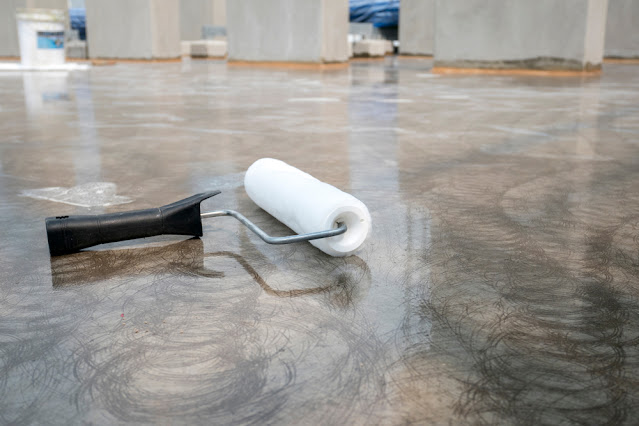Epoxy is nowadays the most trending flooring used in all recent construction. Epoxy flooring has been gaining popularity. After a concrete floor is prepared and smoothed, resin and hardening chemicals are added onto the layer. Over a few days, the chemical reaction will transform the mixture into hard plastic flooring. The compound is then poured onto concrete and left to harden before being applied to the third or fourth layer. It can be made solid and stain-resistant by this liquid to reliable process.
 |
| Epoxy Flooring |
Installation Of Epoxy Flooring
First step:
Prepare the floor surface for laying epoxy flooring. It is essential to prepare the floor surface for epoxy coating.
Second step:
The surface is cleaned of foreign materials, such as dust particles. It is then scarified to create a smoother bond with the mother floor. Epoxy flooring is durable when all cracks are repaired and patched.
Third step:
The floor is primed with the primer coat. It is essential to ensure that primer penetrates the floor during priming.
Fourth step:
Apply the primer coat and fill in any cracks or holes on the floor with epoxy. Additionally, the floor should be ground and sanded before being re-layered.
Fifth step:
A significant amount of water is applied to the floor to test the sealant. Epoxy coating can be used to the floor if the water has not soaked in.
Final stage:
·The epoxy hardener is combined with epoxy resin and applied to the floor in many layers. The epoxy floor should be cured after application. Only when epoxy reacts with another curing agent is the curing process initiated.
Epoxy Flooring: Benefits And Advantages
Let's look at the benefits and advantages that epoxy flooring offers. Epoxy flooring offers many advantages over other floor coverings like vinyl, tiles, or carpet.
- Aesthetics: this is a seamless and easy-to-clean surface that can be used as a floor. It comes in a variety of gloss levels, including satin, gloss, and glossy. You can also add colored microchips or metallic pigment additives to your epoxy flooring design.
- Maintenance: Epoxy flooring is seamless and waterproof and can be used for indoor and outdoor use. The floors are easy to clean, requiring only a standard mop with a general-purpose cleaner or a scrubber. No waxing or buffing is needed. Such floors are a long-lasting investment that must have little maintenance beyond regular cleaning.
- Safety: It has a few lesser-known benefits. It can be applied with sand to create a non-slip surface. This aspect is essential for industrial and commercial spaces, as safety should always be the primary concern.
- Durability: These floors can be used for foot traffic, truck traffic, and forklift traffic. Industrial flooring can withstand everyday abuse from many different equipment and manufacturing processes. Epoxy flooring is a chemical-resistant and abrasion-resistant material that most industrial manufacturers can use.
- Environment suitability: This is the most flexible deck option. It can be used in a wide range of environments, including industrial, commercial, and medical.
- Green Credentials: Many companies are leading manufacturers of resin flooring. Many of the solutions we offer are solvent-free and low in VOCs. They also pose no environmental dangers.
An epoxy floor is a flexible, versatile flooring option that is durable, chemical-resistant, customizable, and customizable. It is mainly used in hospitals, schools, and garages. And also, it can also be used in residential living rooms, kitchens, and other types of rooms. Also, there are many epoxy flooring options available.
Comments
Post a Comment